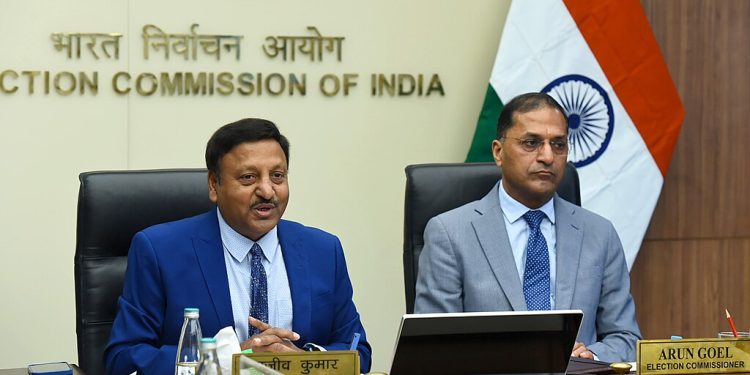In a move that has sparked controversy and raised questions about the impartiality of India’s Election Commission, recent reports suggest that the commission’s leadership appointments have become increasingly partisan. The allegations, outlined in a comprehensive fact sheet by independent observers, shed light on a troubling trend that has significant implications for India’s democratic processes.
According to the report released by The London Story (TLS), a prominent watchdog organisation based in Europe, the appointments to key positions within the Election Commission of India (ECI) have been marred by political favouritism and lack of transparency. The fact sheet, titled “Partisan Appointment of Election Commission in India,” presents compelling evidence of the erosion of institutional integrity within one of the world’s largest democracies.
At the heart of the issue are allegations of undue influence by the ruling political party in the selection process for commissioners. The report highlights instances where individuals with close affiliations to the ruling party have been appointed to influential positions within the Election Commission, raising concerns about conflicts of interest and compromised independence.
“In December 2023, the Government of India enacted the Chief Election Commissioner and other Election Commissioners (Appointment, Conditions of Service and Term of Office) Act 2023, which reformed the process through which members of Election Commission of India (ECI) are appointed. Given the extensive powers given to the Election Commission of India in conducting elections, the law has raised concerns about the free and fair elections in India.”, the report says in its introduction.
“The Constitution of India stipulates the appointment of the ECI through an act of parliament. It is a fair expectation from the largest democracy in the world that any such act of parliament in form of a legislation adheres to the principles of natural justice and fairness.”, the report says, adding, “However, the December 2023 amendment to the procedures for appointing the Chief Election Commissioner (CEC), and the Election Commissioners (EC) allows the Prime Minister potentially two votes out of three for nominating candidates for appointment as CEC and EC: The new amendment states that the three-person committee would consist of (a) Prime Minister (b) Member of the opposition (c) a Cabinet minister nominated by the Prime Minister. This formation of the nomination committee imparts partisan character to the appointment of the CEC and ECs, making the process open to unfairness.”
The Constitution of India stipulates the appointment of the ECI through an act of parliament. It is a fair expectation from the largest democracy in the world that any such act of parliament in form of a legislation adheres to the principles of natural justice and fairness.
The London Story
One of the key findings of the fact sheet is the lack of clear and objective criteria for the appointment of commissioners. Instead, the report suggests that political considerations often take precedence over merit and experience. This politicisation of the appointment process undermines the credibility of the Election Commission and erodes public trust in the integrity of India’s electoral system.
Furthermore, the report raises concerns about the impartiality of the Election Commission in overseeing the conduct of elections. With partisan appointments at the helm, there are fears that the commission may not be able to fulfill its constitutional mandate to ensure free and fair elections. The erosion of institutional independence poses a significant threat to the democratic fabric of India.
The fact sheet also points to instances of interference in the functioning of the Election Commission by the executive branch of government. Allegations of pressure tactics and intimidation tactics aimed at influencing the commission’s decisions have further fueled apprehensions about the erosion of democratic norms in India.
The findings of The London Story’s report have prompted calls for urgent reforms to safeguard the independence and integrity of the Election Commission. Civil society organisations and opposition parties have urged the Indian government to take concrete steps to depoliticize the appointment process and strengthen the autonomy of the commission.
In response to the allegations, government officials have dismissed the claims of partisan appointments, asserting that the selection process adheres to established norms and guidelines. However, critics argue that without meaningful reforms, the credibility of the Election Commission will continue to be called into question.
The issue of partisan appointment of election commissioners is not unique to India, but the scale and implications of the problem in the world’s largest democracy are significant. As India prepares for crucial state and national elections in the coming years, ensuring the independence and impartiality of the Election Commission is paramount to upholding the principles of democracy and preserving the integrity of the electoral process.
The London Story’s fact sheet shines a spotlight on the challenges facing India’s Election Commission and underscores the urgent need for reforms to safeguard the commission’s independence and restore public trust in the democratic process. As the nation grapples with these issues, the future of Indian democracy hangs in the balance.
Read the full report by The London Story.











